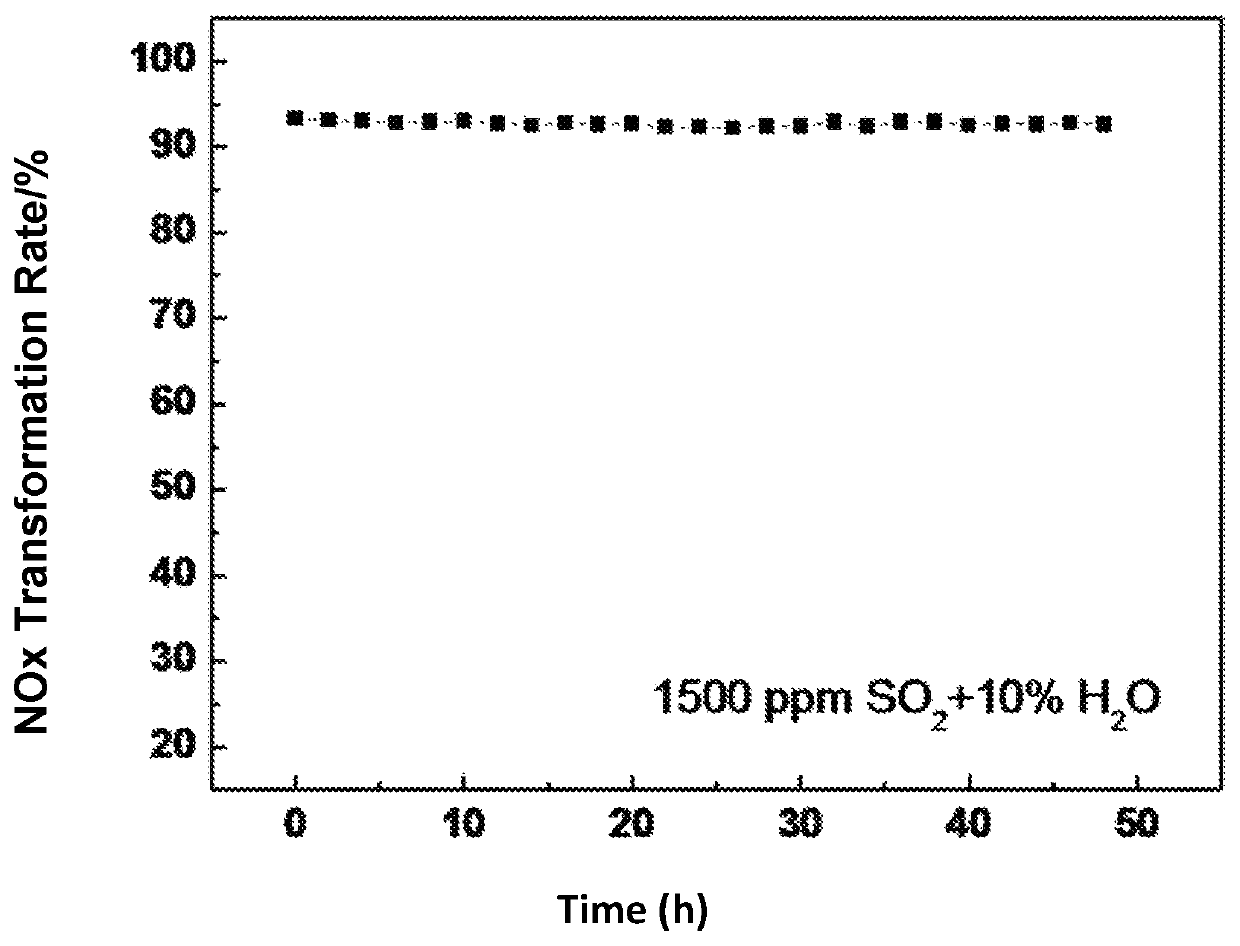Method for preparing molecular sieve-multielement oxide composite integrally extruded denitration catalyst
a technology of oxide composite and integral extrusion, which is applied in the direction of metal/metal-oxide/metal-hydroxide catalyst, physical/chemical process catalyst, separation process, etc., can solve the problems of serious pollution of the ecological environment, rapid increase of nox pollutants, endanger human health, etc., and achieve good water and sulfur poisoning resistance
- Summary
- Abstract
- Description
- Claims
- Application Information
AI Technical Summary
Benefits of technology
Problems solved by technology
Method used
Image
Examples
embodiment 1
[0038]Step (1) is implemented in the following way: adding 1.6 g of copper acetate (Cu(CH3COO)2.H2O) into 100.0 g of deionized water and stirring until the copper acetate is completely dissolved; adding 20.0 g of ZSM-5 molecular sieves (the molar ratio of SiO2 to Al2O3 is 25) and stirring for 2 h in an 80° C. constant-temperature water bath; then, adding 2.0 g of F127 and stirring until F127 is completely dissolved; and mixing for 20 min by using a JRJ300-S digital shear emulsification mixer. Herein, the mass of Cu in the copper solution is 2.5% of the mass of the molecular sieves.
[0039]Step (2) is implemented in the following way: adding 13.1 g of ferrous sulfate (FeSO4.7H2O), 3.0 g of titanium oxysulfate (TiOSO4) and 1.5 g of zirconium oxychloride (ZrOCl2.8H2O) into 335.0 g of deionized water (the mass fraction of the solutes is 5%) and then stirring until they are completely dissolved to obtain a solution, marked as Solution A; adding 15.1 g of sodium type silica sol (Na2O2) into...
embodiment 2
[0047]This embodiment differs from Embodiment 1 in the molecular sieves, ion exchange metal and loading used in step (1) and in that the silicon source in step (2) is sodium silicate (Na2SiO3.9H2O). Details are specified as follows:
[0048]Step (1) is implemented in the following way: adding 3.3 g of ferrous sulfate (FeSO4.7H2O) into 100.0 g of deionized water and stirring until the ferrous sulfate is completely dissolved; adding 20.0 g of Zeolite Mordenite molecular sieves (the molar ratio of SiO2 to Al2O3 is 15) and stirring for 2 h in an 80° C. constant-temperature water bath; and adding 2.0 g of F127 and mixing for 20 min by using a JRJ300-S digital shear emulsification mixer. Herein, the mass of Fe in the ferric solution is 3.2% of the mass of the molecular sieves.
[0049]Step (2) is implemented in the following way: adding 13.1 g of ferrous sulfate (FeSO4.7H2O), 3.0 g of titanium oxysulfate (TiOSO4) and 1.5 g of zirconium oxychloride (ZrOCl2.8H2O) into 335.0 g of deionized water (...
embodiment 3
[0051]Step (1) is implemented in the following way: adding 1.4 g of copper sulfate (CuSO4.5H2O) and 1.6 g of ferrous sulfate (FeSO4.7H2O) into 140.0 g of deionized water and stirring until they are completely dissolved; adding 20.0 g of SSZ-13 molecular sieves (the molar ratio of SiO2 to Al2O3 is 22) and stirring for 2.5 h in a 75° C. constant-temperature water bath; and adding 3.5 g of cetyltrimethylammonium bromide, stirring until cetyltrimethylammonium bromide is completely dissolved, and mixing for 10 min by using a JRJ300-S digital shear emulsification mixer. Herein, the mass of Cu and Fe in the mixed solution is 3.3% of the mass of the molecular sieves and the molar ratio of Cu to Fe is 1:1.
[0052]Step (2) is implemented in the following way: adding 3.2 g of manganese sulfate (MnSO4.H2O), 18.0 g of cerium sulfate (Ce(SO4)2.4H2O), 4.6 g of titanium sulfate (Ti(SO4)2), 8.8 g of zirconium sulfate (ZrOSO4.4H2O), and 8.5 g of aluminum sulfate (Al2(SO4)3.18H2O) into 172.4 g of deioni...
PUM
| Property | Measurement | Unit |
|---|---|---|
| liquid-solid mass ratio | aaaaa | aaaaa |
| molar ratio | aaaaa | aaaaa |
| particle size | aaaaa | aaaaa |
Abstract
Description
Claims
Application Information
 Login to View More
Login to View More - R&D
- Intellectual Property
- Life Sciences
- Materials
- Tech Scout
- Unparalleled Data Quality
- Higher Quality Content
- 60% Fewer Hallucinations
Browse by: Latest US Patents, China's latest patents, Technical Efficacy Thesaurus, Application Domain, Technology Topic, Popular Technical Reports.
© 2025 PatSnap. All rights reserved.Legal|Privacy policy|Modern Slavery Act Transparency Statement|Sitemap|About US| Contact US: help@patsnap.com

